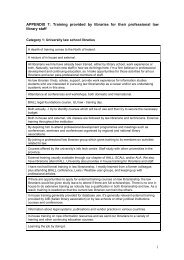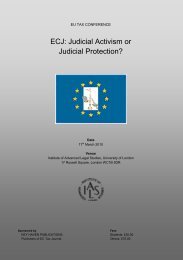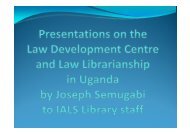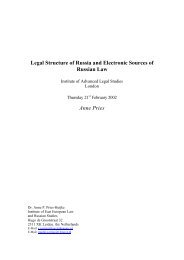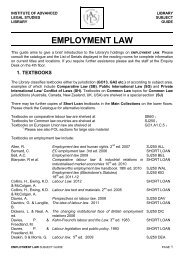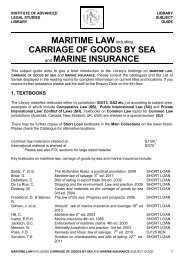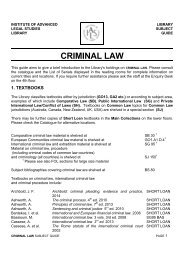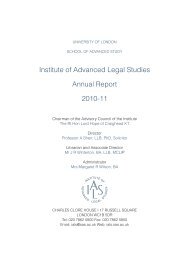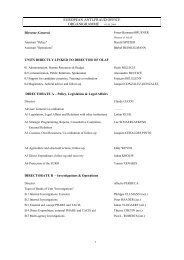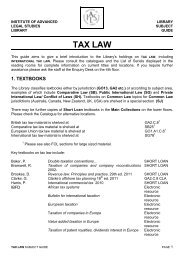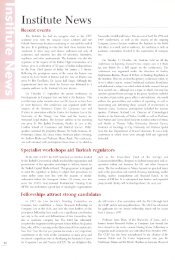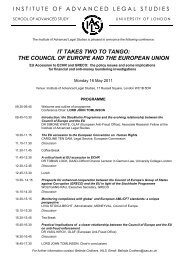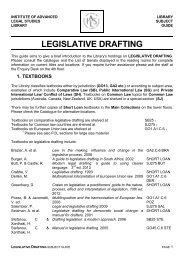a thesis - Institute of Advanced Legal Studies
a thesis - Institute of Advanced Legal Studies
a thesis - Institute of Advanced Legal Studies
You also want an ePaper? Increase the reach of your titles
YUMPU automatically turns print PDFs into web optimized ePapers that Google loves.
24 TRUSTS IN GENERAL.<br />
If, however, the property is incapable <strong>of</strong> assignment, either<br />
from its nature or on the ground <strong>of</strong> public policy, or by express<br />
statutory enactment, it cannot be made the subject <strong>of</strong> a trust. So<br />
it was held in the Buckhurst Peerage (1876, 2 App. Cas. 1) that a<br />
title <strong>of</strong> honour such as a peerage cannot be made the subject <strong>of</strong> a<br />
trust, because it is a personal possession and cannot be held by one<br />
person in trust for another. And in Dads v. Duke <strong>of</strong> Marlborough<br />
(1818,1 Swanst. 74) that the pension granted by the stat. 5 Anne,<br />
c. 4, to the great Duke <strong>of</strong> Marlborough and his posterity as a<br />
reward for his public services could not be validly assigned upon<br />
trust. The principle on which property is held incapable <strong>of</strong> being<br />
assigned in cases like the last is explained by Lord Langdale in<br />
Grenfell v. The Dean and Canons <strong>of</strong> Windsor (1840, 2 Beav. at<br />
p. 549). "There are various cases," he says, "in which public<br />
duties are concerned, in which it may be against public policy, that<br />
the income arising for the performance <strong>of</strong> those duties should be<br />
assigned; and for this simple reason, because the public is interested,<br />
not only in the performance from time to time <strong>of</strong> the<br />
duties, but also in the fit state <strong>of</strong> preparation <strong>of</strong> the party having<br />
to perform them. Such is the reason in the cases <strong>of</strong> half pay,<br />
where there is a sort <strong>of</strong> retainer and where the payments which are<br />
made to <strong>of</strong>ficers from time to time are the means by which they,<br />
being liable to be called into public service, are enabled to keep<br />
themselves in a state <strong>of</strong> preparation for performing their duties.<br />
If, therefore, they were permitted to deprive themselves <strong>of</strong> their<br />
half pay, they might be rendered unable promptly to enter upon<br />
their duties when called upon, and the public service would be<br />
thereby greatly injured. So also where pension or remuneration<br />
is given for a purpose which tends less directly to the public<br />
benefit, as, for instance, was the case in Da vis v. The Duke <strong>of</strong> Marlborough.<br />
.... In that case the pension was held inalienable,<br />
because it was considered that one <strong>of</strong> the objects <strong>of</strong> giving the<br />
pension, namely, for having a perpetual memorial <strong>of</strong> national<br />
gratitude for public services, would be entirely lost; and so in the<br />
course <strong>of</strong> the case Lord Eldon said, in the way <strong>of</strong> illustration and<br />
in allusion to the pension <strong>of</strong> a great public <strong>of</strong>ficer, that it could<br />
not be aliened because that public <strong>of</strong>ficer must not be allowed to<br />
fall into such a situation as to make it difficult for him in consequence<br />
<strong>of</strong> any pecuniary embarrassment to maintain the dignity<br />
<strong>of</strong> his <strong>of</strong>fice."<br />
Further, the subject <strong>of</strong> the trust must be property. A mere



